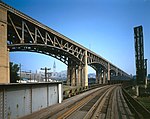The Flats
Czech-American culture in ClevelandDowntown ClevelandHistoric districts in OhioIrish-American culture in ClevelandNeighborhoods in Cleveland ... and 1 more
Redeveloped ports and waterfronts in the United States

The Flats is a mixed-use industrial, entertainment, and increasingly residential area of the Cuyahoga Valley neighborhood of Cleveland, Ohio, USA. The name reflects its low-lying topography on the banks of the Cuyahoga River.
Excerpt from the Wikipedia article The Flats (License: CC BY-SA 3.0, Authors, Images).The Flats
Carter Road, Cleveland
Geographical coordinates (GPS) Address Nearby Places Show on map
Geographical coordinates (GPS)
| Latitude | Longitude |
|---|---|
| N 41.492 ° | E -81.696 ° |
Address
Carter Road
Carter Road
44113 Cleveland
Ohio, United States
Open on Google Maps











